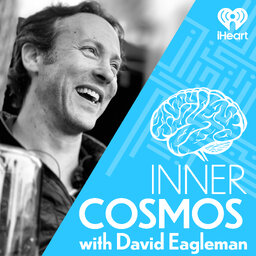Ep18 "Could you upload your brain to live forever?"
How would we know if we were living in a simulation? What if you were a butterfly having a dream it was a human? What does any of this have to do with John Lennon, or Renee Descartes, or freezing yourself in a vat of liquid nitrogen? How will we eventually solve the problem that human bodies can’t do space travel? Join Eagleman for a wild ride into the strange possibility of making brains immortal.
In 1 playlist(s)
Inner Cosmos with David Eagleman
Neuroscientist and author David Eagleman discusses how our brain interprets the world and what that …Social links
Follow podcast
Recent clips

Ep138 "Why do our political brains mistake opinion for truth?" with Kaizen Asiedu
1:07:52

Ep137 "Do cures ever create the next crisis?" with Thomas Goetz
47:09

Ep136 "Why do we care about mattering?" with Rebecca Goldstein
41:31
 Inner Cosmos with David Eagleman
Inner Cosmos with David Eagleman